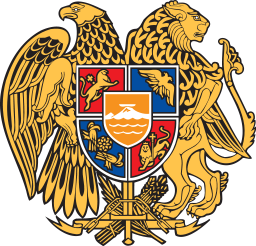-
MINISTRY

-
FUNCTIONS

- Economic Policy
-
Agriculture
- Agrarian policy
- Agrarian policy Agrarian policy
- Agro-processing
- Agro-processing Agro-processing
- Animal breeding
- Animal breeding Animal breeding
- Veterinary medicine
- Veterinary medicine Veterinary medicine
- Plant cultivation
- Plant cultivation Plant cultivation
- Phytosanitary
- Phytosanitary Phytosanitary
- Agricultural cooperation
- Agricultural cooperation Agricultural cooperation
- Fish farming
- Fish farming Fish farming
- Organic agriculture
- Organic agriculture Organic agriculture
- Public Investment
- Investment Policy
- Free Economic Zones
- Industrial Policy
- Business Environment
- Small and medium-sized entrepreneurship
- International Cooperation
- Armenia - European Union
- Armenia-EAEU
- Armenia - WTO
- Trade and Market Regulation
- Tourism
- Capital market
- Quality infrastructure
- Сtrategic sectors
- Licensing, permits
- Intellectual Property
-
PROJECTS

- State Support Programs for Agriculture
- Economy modernization program
- Infrastructure for investment assistance event
- CARMAC II Project
- State support program for issuance and rating
- The state support program for commercial companies engaged in the production of economically complex products
- Fee and cost reimbursement program for drug registrations and re-registration examinations
- Program for Compensation of Costs of Clinical Trials and Bioequivalence Studies in the Republic of Armenia
- International cooperation projects
-
INFORMATION

-
MEDIA CENTER

- CONTACTS
- Economic Policy
- Agriculture
- Public Investment
- Investment Policy
- Free Economic Zones
- Industrial Policy
- Business Environment
- State Support Programs for Agriculture
- Economy modernization program
- Infrastructure for investment assistance event
- CARMAC II Project
- State support program for issuance and rating
- The state support program for commercial companies engaged in the production of economically complex products
- Fee and cost reimbursement program for drug registrations and re-registration examinations
- Program for Compensation of Costs of Clinical Trials and Bioequivalence Studies in the Republic of Armenia
- International cooperation projects
Home
FUNCTIONS
Armenia's current economic development policy aims to ensure the rapid and efficient transformation of the economy into a system characterized by:
High receptivity to rapid technological advancements and the compensation of resource gaps through the accumulation and application of new ideas.
Preservation of intergenerational equity, ensuring that present growth and development achievements do not deplete the minimum opportunities for similar growth for future generations.
Implementation of fundamental requirements for inclusive development by creating a favorable environment and encouraging the broadest possible participation of society in the growth process, proclaiming entrepreneurship and initiative as crucial incentives for business activity.
Consistent development of human capital, viewing it as the core of economic transformation and a prerequisite for forming competitive advantages, regardless of objective constraints.
Maximizing the harmonization of the directions of using internal and external resources with the development priorities and deeply rooted demand for the results of the policy.
Economic research plays a crucial role in the Ministry of Economy of the Republic of Armenia, providing the necessary data, analyses, and insights to support policy formation, strategic planning, and decision-making processes.
Economic research is the cornerstone of making effective decisions. It helps to develop effective economic policies by analyzing current economic conditions, identifying challenges, assessing key risks for the economy, and forecasting future trends.
Based on research, policymakers can make more accurate decisions when developing short, medium, and long-term economic policies, leading to positive economic outcomes. The econometric models used in economic research allow for the forecasting of GDP growth, inflation rates, employment trends, and other key economic indicators, which form the basis for corresponding assessments. Conducting macroeconomic research, analyses, and monitoring on a scientific basis enables the Ministry to develop contemporary and effective economic policies and present recommendations on social, financial, budgetary, monetary, and external economic policies.
Research provides an in-depth analysis of various economic sectors, such as agriculture, industry, services, and more. This helps to understand sector-specific issues and supports the formation of targeted policies to promote growth and development.
Continuous evaluation of current policies is essential to ensure their effectiveness. Economic research provides rigorous impact analysis tools, enabling the Ministry to make adjustments or revise policies based on factual data.
By understanding the factors contributing to economic resilience, the Ministry can develop strategies that reduce risks and increase the economy's capacity to withstand shocks.
-
Hot line

* Hot line operates on weekdays (Monday-Friday) from 09:00 to 18:00.
- BUSINESS ENVIRONMENT
- (+374 11) 597 539
- TOURISM
- (+374 11) 597 157
- QUALITY INFRASTRUCTURES
- (+374 11) 597 167
- PRODUCT LABORATORY TESTING
- (+374 11) 597 166




